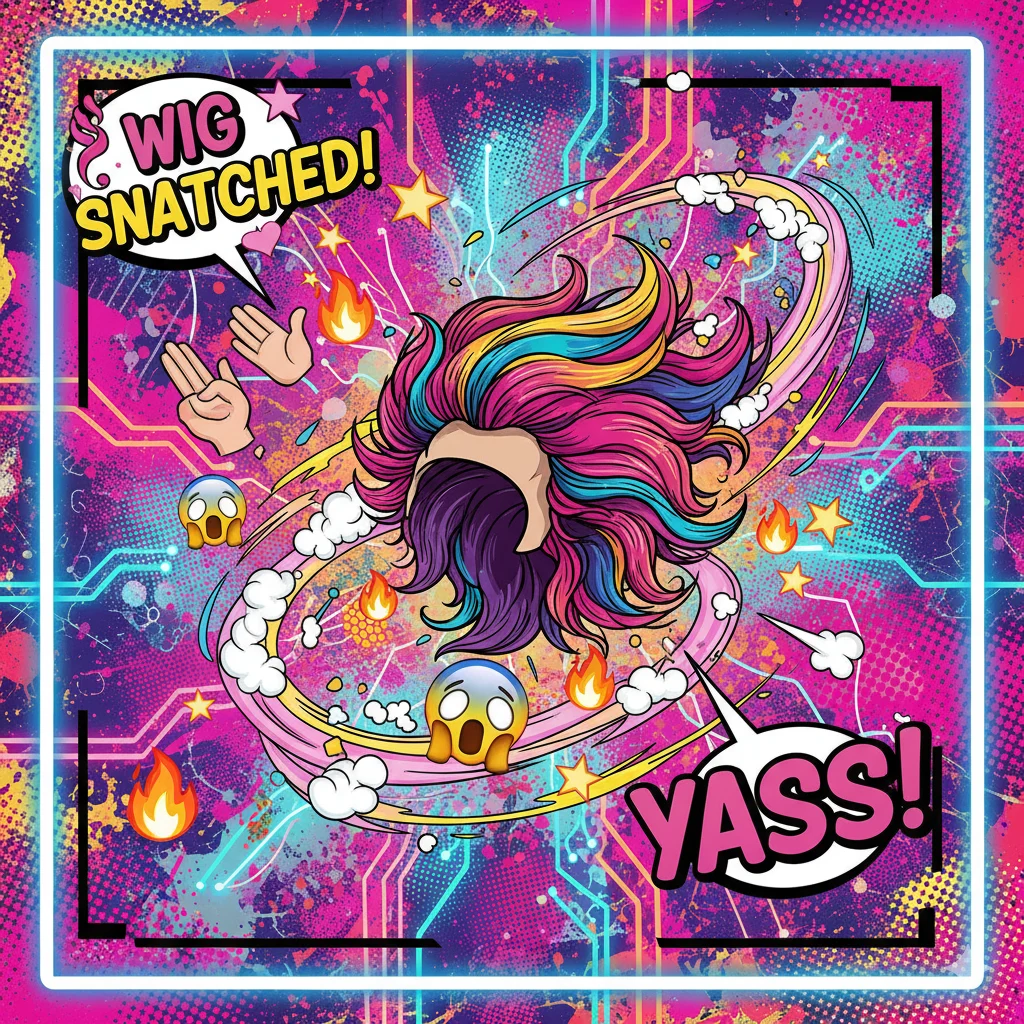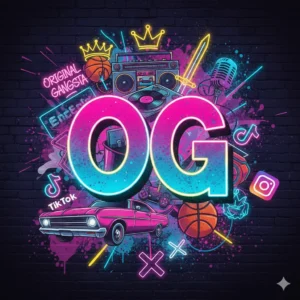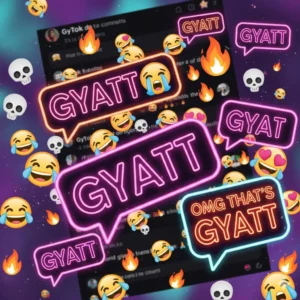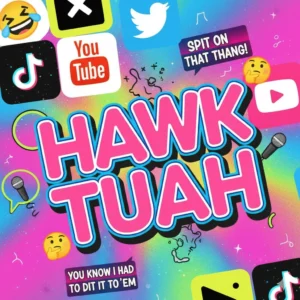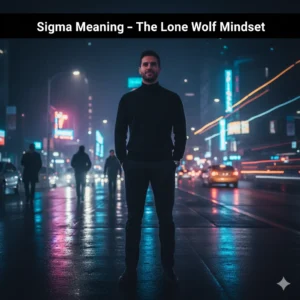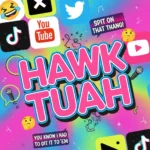If you’ve ever scrolled through TikTok, Twitter (X), or Instagram and seen people commenting “WIG!” under a celebrity post or reaction video, you might wonder what it means. Don’t worry — no one’s literally talking about hairpieces flying off!
In slang, “wig” is a dramatic, expressive word used to react to something so amazing, shocking, or exciting that it figuratively makes your wig “fly off” your head. It’s all about showing enthusiasm, admiration, or surprise — a perfect mix of camp, humor, and internet exaggeration.
Born from drag culture and LGBTQ+ communities, “wig” became a mainstream expression of excitement, especially after pop icons like Lady Gaga and Beyoncé popularized it online. Today, it’s a staple of Gen Z slang, thriving in comments, memes, and reaction videos.
Let’s explore the meaning, origins, uses, and variations of “wig” in slang — and why this tiny word has made such a huge cultural impact.
What Does “Wig” Mean in Slang? 💥
In internet slang, “wig” is used as a reaction to something impressive or unbelievable. It implies that the person is so blown away that their imaginary wig has flown off.
It’s a modern way of saying:
- “That’s amazing!”
- “I’m speechless!”
- “You just blew my mind!”
Example:
- “Did you see that Beyoncé performance?”
→ “Wig. Just wig.”
In short, “wig” = “I’m stunned by how good that was.”
It’s exaggerated, campy, and full of energy — that’s what makes it so fun.
Origin of the “Wig” Slang 🏳️🌈✨
The slang term “wig” comes from drag culture and LGBTQ+ communities. In drag shows, performers wear wigs as part of their glamorous transformations. When something truly amazing happens — like a flawless performance — people joke that their wigs were snatched off by the sheer fabulousness.
The phrase “wig snatched” evolved to mean being blown away. Over time, people shortened it to just “wig.”
Pop culture moments that helped spread the term:
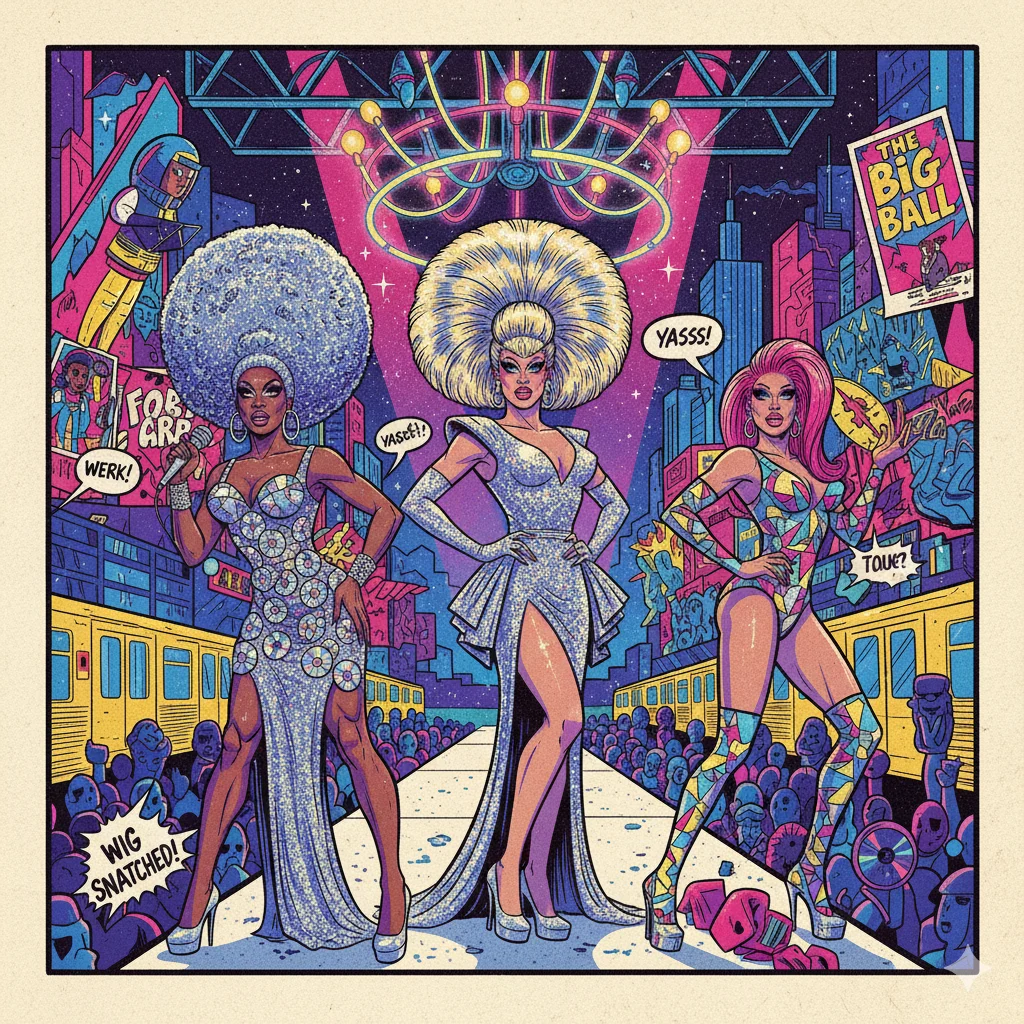
- 🌟 Lady Gaga’s 2011 tweet “Wig. Honestly, truly.” became a meme.
- 🎤 Drag Race queens used it frequently on TV, making it mainstream.
- 💅 Twitter fandoms (like K-pop, Stan Twitter, etc.) adopted it for over-the-top reactions.
From niche queer slang, “wig” grew into a global internet reaction word — now used by fans, creators, and casual users alike.
How to Use “Wig” in Conversations or Online 💬
Using “wig” is simple — but it’s all about attitude. It’s usually a standalone reaction word, often typed in all caps for dramatic effect.
Here are some common examples:
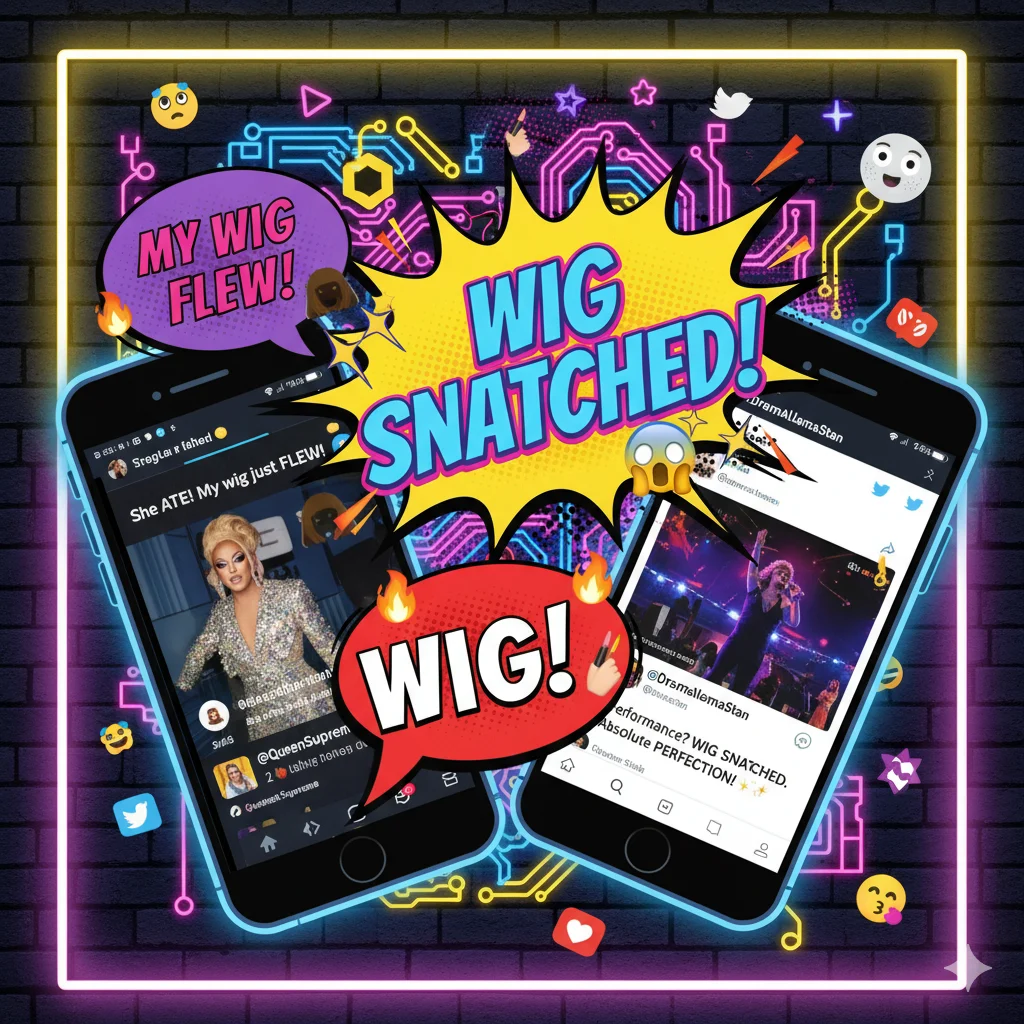
- “You just aced that performance. WIG.”
- “That outfit? Wig!”
- “Omg the plot twist at the end — wig flew.”
- “Wig = blown off = I’m obsessed.”
It can also appear in variations like:
- “Wig snatched” → Completely amazed.
- “My wig flew” → Overwhelmed by how good something was.
- “Wigless” → Speechless or shocked.
Basically, if something leaves you gasping or freaking out (in a good way), you can say: “Wig!”
The Evolution: From “Wig Snatched” to “Wig Flew” 💨
Language evolves fast — and “wig” has had several stylish transformations.
Let’s break down the journey:
| Version | Meaning | Example |
|---|---|---|
| Wig snatched | Totally amazed | “That solo? Wig snatched.” |
| Wig flew | Overwhelmed, can’t handle it | “That high note? My wig flew!” |
| Wigless | Left speechless | “That twist left me wigless.” |
| Wig flew off | Beyond amazed | “OMG. Wig flew off my head.” |
| Wig secured | Didn’t impress | “It was okay. Wig still secured.” |
Each phrase adds a layer of humor and exaggeration — a key feature of internet language.
“Wig” in Pop Culture and Social Media 🌐
“Wig” became a universal internet reaction because of how expressive it is. Here’s where it shows up the most:
- TikTok: Users comment “WIG!” on dramatic glow-ups or performances.
- Twitter/X: Fans reply “wig snatched” under viral tweets or celebrity news.
- Instagram: Meme pages use “wig flew” as captions for shocking moments.
- YouTube: Reaction videos often include “wig moments” or “wig check.”
It’s short, fun, and instantly communicates excitement — perfect for fast-paced digital spaces.
Celebrities like Ariana Grande, Doja Cat, and Lizzo have all used “wig” humorously in interviews or tweets. The word has even appeared in meme compilations and TikTok edits that dramatize fan reactions.
Connection Between “Wig” and LGBTQ+ Vernacular 🌈
To truly understand “wig,” it’s important to appreciate its roots in LGBTQ+ and drag culture.
In drag, “wig” symbolizes transformation — changing one’s identity, appearance, and persona. When something’s “so good it snatches your wig,” it’s metaphorical for being overpowered by fabulousness.
This connection gives the slang depth and cultural pride. It’s playful but also rooted in a community that’s always celebrated creativity and exaggeration.
So while “wig” is now used widely, it carries a lineage of queer joy, resilience, and expression.
Related Slang Terms to “Wig” 🔥
Here are other slang words with similar energy or meaning:
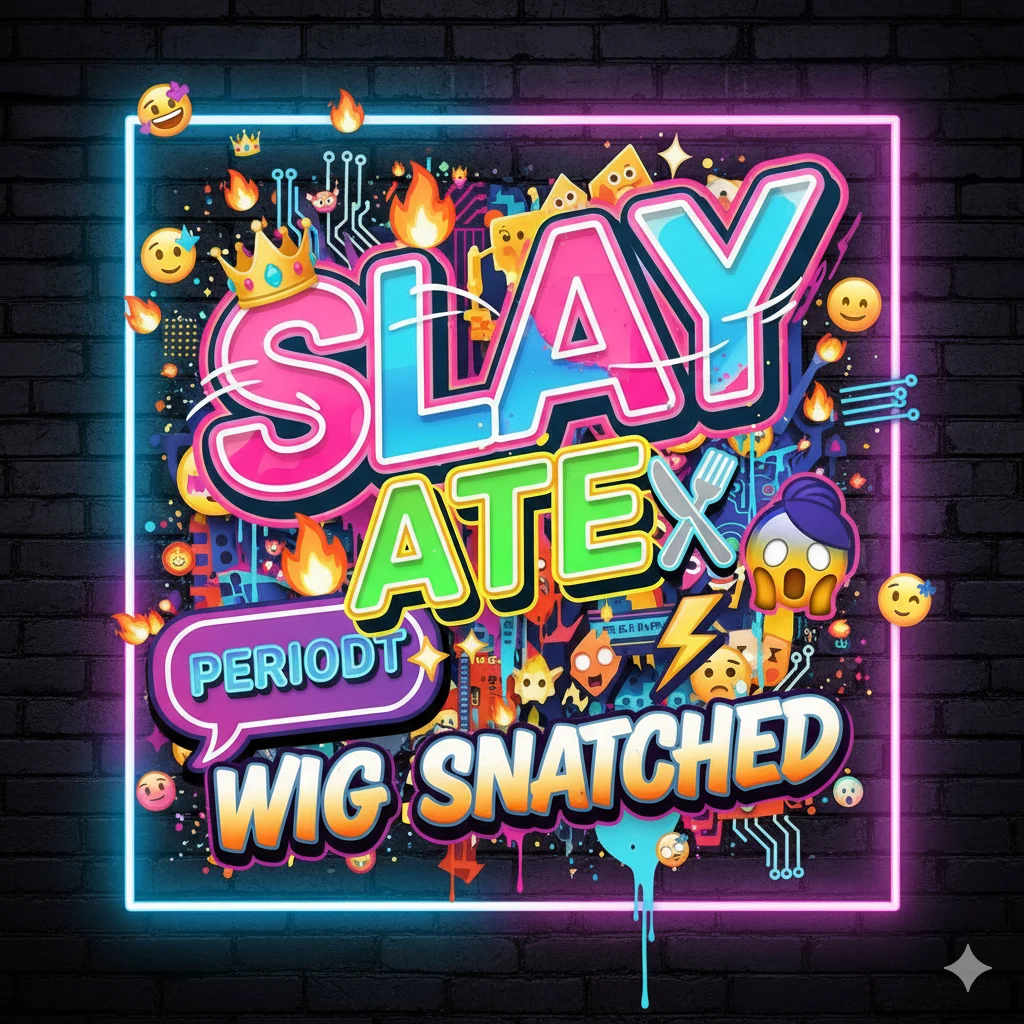
| Slang | Meaning | Similar to |
|---|---|---|
| Slay | To perform amazingly | Wig snatched |
| Gagged | Shocked beyond words | Wigless |
| Ate | Did an amazing job | Wig flew |
| Periodt | End of discussion; emphasis | Wig! |
| Serve | Delivering excellence | Wig flew off |
These expressions often overlap in tone — dramatic, expressive, and over-the-top. They’re staples of Stan Twitter and pop culture fandoms.
Wig Slang in Different Contexts 🧠
“Wig” can fit into many situations — from compliments to reactions to memes.
🎤 In Performances:
“She hit that note like an angel — wig!”
👗 In Fashion:
“Her outfit at the Met Gala? Wig flew off.”
😂 In Jokes or Memes:
“This meme is killing me — wig.”
😱 In Reactions:
“They’re dating?! Wig.”
It’s flexible, energetic, and always carries a hint of campy enthusiasm.
Misunderstandings and Misuse of “Wig” 🚫
Because “wig” is dramatic slang, it can confuse people who take it literally. Some think it’s about actual wigs or hair loss — but online, it’s metaphorical.
Common mistakes:
- Using it in formal contexts (“That presentation was wig” ❌).
- Overusing it until it loses effect.
- Misunderstanding tone — it’s positive, not sarcastic.
Think of it as a reaction word — like saying “Wow!” or “OMG,” but sassier.
Why “Wig” Became a Slang Classic 💫
The secret behind “wig’s” success? It’s short, visual, and expressive.
- It evokes an image (a wig flying dramatically).
- It bridges humor and awe.
- It travels well across cultures through memes and fandoms.
In the era of visual storytelling and reaction-based humor, “wig” fits perfectly. It says a lot — with just one word.
FAQs About “Wig” in Slang
Q1: What does “wig” mean in slang?
It’s a reaction word meaning something is so amazing that it figuratively blew your wig off — pure shock or admiration.
Q2: Where did “wig” originate?
It began in LGBTQ+ drag culture and spread through pop icons and internet fandoms.
Q3: Is “wig” the same as “wig snatched”?
“Wig snatched” is a more dramatic version meaning “completely blown away.”
Q4: Can I say “wig” in real life?
Yes, but it’s most natural in casual, funny, or expressive contexts — not formal ones.
Q5: Is “wig” outdated?
Not at all! It’s still popular in 2025, especially on TikTok and among fandom communities.
Conclusion: Wig — The Word That Defines Online Excitement 🎉
“Wig” started as a fun inside joke in drag culture but evolved into one of the internet’s most beloved expressions. Whether you’re reacting to a K-pop video, a flawless outfit, or a wild plot twist, yelling “WIG!” instantly captures the excitement.
It’s not just slang — it’s a feeling. A virtual gasp. A mini standing ovation wrapped in three letters.
So next time something blows your mind, don’t just say “wow.” Say “WIG!” — and let the drama speak for itself.
